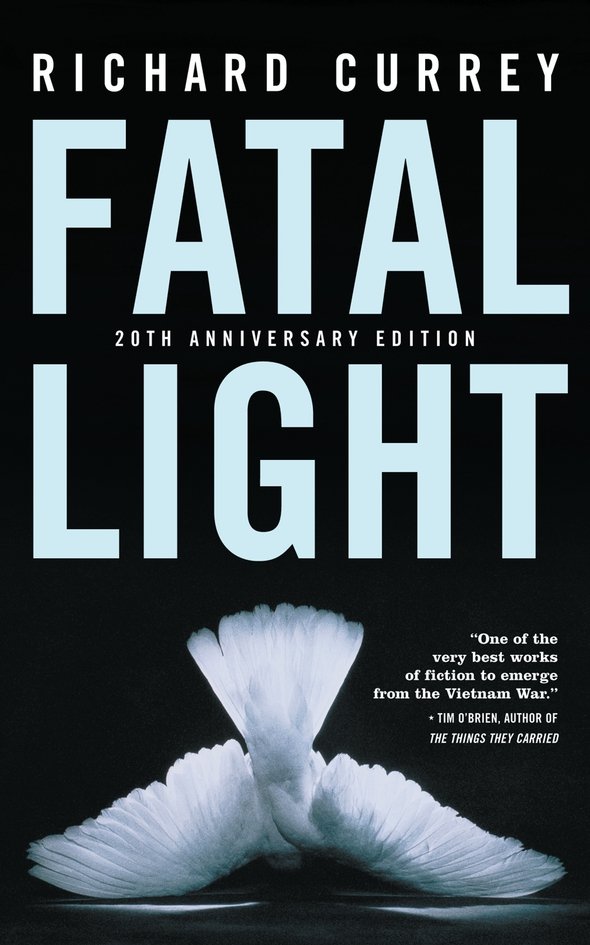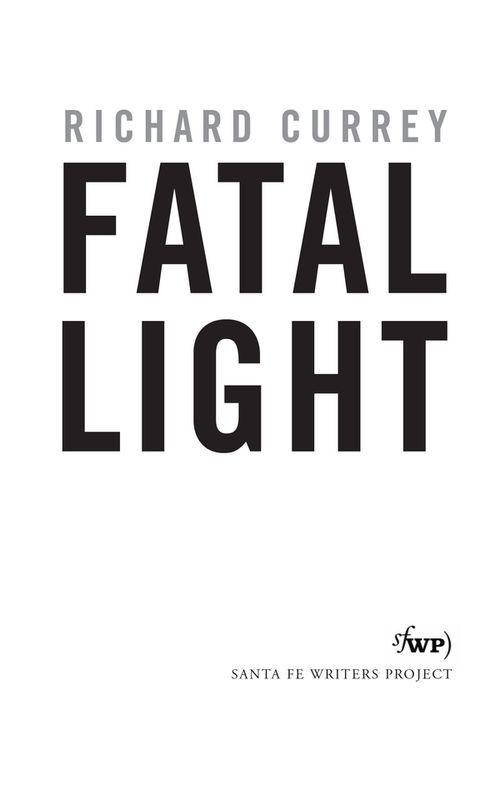Fatal Light
Authors: Richard Currey


Fiction
Â
Crossing Over: A Vietnam Journey
Â
Fatal Light
Â
The Wars of Heaven
Â
Lost Highway
Â
Â
Nonfiction
Â
Medicine for Sale

Copyright © 1988, 2009 by Richard Currey
Â
All rights reserved under international and
Pan-American Copyright Conventions
Â
No part of this book may be reproduced, stored in a database, or other retrieval system, or transmitted in any form, by any means, including mechanical, electronic, photocopy, recording or otherwise, without the prior written permission of the publisher.
Â
Santa Fe Writers Project, SFWP and colophon are trademarks.
Â
Library of Congress Cataloging-in-Publication Data
Â
Currey, Richard, 1949-
Fatal Light/by Richard Currey.â20th anniversary ed.
p. cm.
Â
ISBN-13: 978-0-9776799-2-8
ISBN: 0-9776799-2-6
1. Vietnam War, 1961-1975âFiction. I. Title.
PS3553.V6665F38 2009
813'.54âdc22
Â
2008056003
Â
Cover design by Bill Douglas at The Bang
Printed and bound in Canada
Â
Visit SFWP's website:
www.sfwp.com
and literary journal:
www.sfwp.org
Â
Â
This is a work of fiction. Names, characters, places, incidents, and episodes are products of the author's imagination or are used fictitiously and are not construed to be real. Any resemblance to actual events, locales, organizations, or persons, living or dead, is entirely coincidental.
A few years ago I visited Cannon Air Force Base. Situated out in the great wide open of southern New Mexico, Cannon is the home of the 27
th
Special Operations Wing. The occasion of my visit was a National Endowment for the Arts program called Operation Homecoming. In partnership with the Department of Defense and Boeing Aircraft, Operation Homecoming dispatched more than 20 poets, novelists, and journalists to bring writing workshops to veterans of Iraq and Afghanistan at numerous duty stations both within the US and abroad, including in the combat theatre in the Middle East. Operation Homecoming introduced many of our troops to the idea that writing about their military and combat experiences might serve them, the nation, and the greater good in a number of ways. Aside from the possibility that some form of emotional catharsis and at least a step toward psychological healing might stem from self-expression, Operation Homecoming also
sought to allay fears that many might have regarding the act of putting words on paper, to explore the mechanics and challenges of the writing process, and looked to foster a safe and tempered environment for all kinds of writers with all manner of notions about how to say what they wanted to say.
I rented a car in Albuquerque and drove the 200 miles southeast to arrive at Cannon's main gate after dark. It was the first time I had been on a military installation in more than 30 years. The gate sentries were officious and vaguely threateningâas they were supposed to beâand asked me to pull into a space adjacent to the guardhouse and wait in the car. I parked and sat and in a moment the base's executive officer arrived. He was a colonel, geared out in field jacket and camos and garrison cap. He smiled and shook my hand and welcomed me on behalf of his commanding officer and said that I was to follow his driver to the BOQ (Bachelor Officers Quarters) where I was “billeted” for the night. The requisite introductory speech concluded, the colonel leaned a bit closer and said that when he learned I was coming he looked up my work, and got hold of a copy of
Fatal Light
.
He told me that he was not a reader, and was generally intolerant of “stuff that's made up.” He noted that most of his reading kept to official documents and aviation manuals and an occasional newsmagazine.
Fatal Light
was the first fiction he had read in many years. He thanked me for “keeping the book short,” and said he thought the story I told was powerful and surmised that it would ring true to the experience of many. But then he lowered his voice and said, “And it was written by a very angry young man.”
My Operation Homecoming colleagues were arriving by then, and the personal moment with the colonel passed. Later that evening, after drinks and dinner and conversation were had and I was back in my room, I stepped out and sat on a wooden bench in a small grassy area. The New Mexico sky was domed and improbably vast, belted with stars. The night hovered,
quiet beyond measure except for the sound of the wind, blowing out in the endless blue dark of the desert, and I thought about the colonel's remark. He was a man who, by his own admission, brought no particular sophistication in the ways of novels and storytelling to his reading. He took
Fatal Light
straight on, read without pretension or expectation, and immediately understood the emotional core of the novelâa young combat veteran's sad, dispirited, convoluted, muted rage. The colonel had brought a finger down on the precise heart of the story.
Fatal Light
was written in my late 20s and was the evolution of a decade of writing poetry, then prose poetry, and, beginning in 1980, short stories. Most of my working tenets as a writer developed through the disciplines of these short forms. As I evolved toward ever-longer stories (and realized I was becoming a novelist), I wanted to bring the brevity and clarity of focus of the shorter forms I had worked with to a broader storytelling purpose.
Fatal Light
was the culmination of that, and I framed my story with the classic elements of all war stories told over the last 2,000 years: A young man lifted from an innocent life, plunged into the fear and rabid confusion of war, and then, surviving it, left to pick up his own pieces on the long way home. But aside from reflecting my own historical moment and my generation's place in that moment, I wanted to tell an old story from what I hoped might be a different approach, a stripped-down journey through a soldier's life and mind where the nature of war is recalibrated in its purest terms.
Fatal Light
drew from some of my own experiences as a Navy corpsman serving with several Marine Corps combat and combat-ready units between 1968 and 1972. But the book is informed not by the literal particularities of my own experience (indeed, most of
Fatal Light
is highly fictionalized), but by the emotional residue of a few years deep inside Marine infantry units, the “grunts” who function as the first phalanx, down where one can smell the earth and the rain and the riven sweat
of the men standing behind and in front and on either side. I was an enlisted man serving with mostly other enlisted men in units that were often ordered into action with the barest of rationale, explanation, or any sense that logic or intelligence was at work anywhere in the process. For me, wartime military service was a quintessential existential experience. And, afterwards, there was, at least for me, a well of anger fueled by a sense of purposeless death and cynical manipulation of men and armies for the sake of what I believed to be short-sighted and self-serving political aims.
Years have passed and the fervor of my politicization at the age of 20 has been chiseled by any number of realizations along the way, but I still believe that my old anger was neither misplaced nor inappropriate. Yes, wars are vastly complex affairs poorly served by any attempt to simplify or universalize them. But, still, historical analysis does not and will never blunt the reality that it is the warriors themselves who go home (if they make it home) with the burden. And they become the carriers of war's legacy, experienced by all of them differently but, finally, held in common. And their stories, be they written as the high art of poetry and novels and personal nonfiction, or told over dinner years later at a family gathering, or perhaps never told at all beyond hints and evasions, become an essential part of a nation's fabric, part of that strange post-war blend of pride and regret, honor and sorrow, shame and satisfaction.
Fatal Light
is a novel sheared down to the primary essentials of the story it tells and the spiritual predicament it describes, one that has no resolution, no solution, that joins the texture of a life and, as the unnamed young narrator of
Fatal Light
says at one point, sticks there “like a photograph on the spine.”
At another point that narrator notes that “war stories are our oldest stories.” So it seems, as we now find ourselves slogging through our latest war, two of them, in fact, fought on two fronts. This two-front war's books and poems and memoirs and potent reports from the morphing lines of battle have been
arriving. It is another hard dawn for another battered army, and some of its troopers again feel and write and try to come to terms somewhere in their souls and lives. It is a pleasure to see my own contribution to this tradition revived in this beautiful new edition of
Fatal Light
. I hope my view of a kind of universal experience might continue to speak to and resonate with the “Iraq and Afghanistan Generation”âby which I mean not only those of you who have or are now serving in uniform, but all of you. Like the Vietnam Generation before you, your war will mark you, and change you, and, finally, define you.
Â
Richard Currey
February 2009
